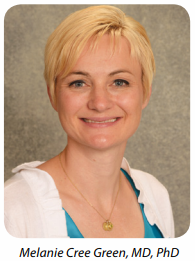Melanie Cree Green, MD, PhD
Ludeman Center Jul 1, 2016 Dr. Cree Green has been affiliated with the Ludeman Center since she received her first seed grant award in 2013.Let’s check in to see what she’s been up to recently.
Dr. Cree Green has been affiliated with the Ludeman Center since she received her first seed grant award in 2013.Let’s check in to see what she’s been up to recently. Tell us about your recent accomplishments:
“Last June I became the first female physician from the CU Anschutz Medical Campus to receive one of six Boettcher-WebbWaring Foundation Investigator Awards. Also last year, I was honored to receive a National Institute of Diabetes and Digestive and Kidney Diseases K-23 grant in September, which will partially fund my research for the next 3-5 years. I also received an American Diabetes Association career development grant in December. This year I was given an award from the Doris Duke Fund to Retain Clinical Scientists, and I just gave my first invited symposia at the Endocrine Society national meeting in Boston, entitled “Insulin Resistance in Obesity and Adolescence.’” You’ve been busy!
What does your year ahead look like?
“I am currently two-thirds of the way done enrolling for my current study in girls with polycystic ovarian syndrome (PCOS), and will continue to work on this project over the next year. We are also working on several multi-center studies looking at insulin resistance in different populations, and will continue to enroll for these studies. We are also completing analysis and publishing results from our last study. I have two abstracts that will be presented at the National American Diabetes Association meeting this summer.”
What challenges do you anticipate in your upcoming research?
“The biggest challenge in human research is the cost, which keeps increasing as the federal funding for core infrastructure continues to be cut. For example, we used to have fully funded research centers as part of the university support for research, but in the last six months have had to start paying for all of our nursing costs. This is a significant fee, and this combined with the increased competition for grant funding continues to make research difficult.”
What do you want the public to know about your current research?
“We are finding that girls who are overweight and also have PCOS have many signs of a metabolic syndrome, including pre-diabetes and diabetes, and that most of them have also increased fat in their liver. Our current research is focused on trying to understand what is involved in making this extra liver fat, and I hope to then be able to start a medication trial in the next few years to prevent this.”
Tags:
CWHR Researcher Spotlight